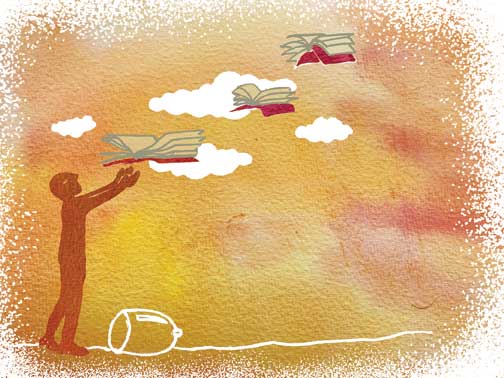Prakash Iyer
“Teaching is an honourable profession,” some say. Others say, we are service providers and students and their parents are customers. This was a raging debate in the staffroom that split the teachers into two sides. I was just listening to the argument.
“Whatever we teach, we know that we are influencing children’s minds and contributing to their transformation into good persons. It is important for our society and for humanity, so we are like parents who care for the children. It is an honourable profession because we are being proxy-parents.”
“We teachers are still service-providers, not parents. We are like a creche where children spend time when parents are not available. We do what parents want us to do. Some parents complain that their children are not learning to speak good English. Others say we are not disciplining their children. We decided that all of us will speak English only when we are with students and insist that they speak English too. See how intelligently we dealt with both problems – discipline and English taken care of with one rule. This is good customer-service. Being a good service-provider is honourable too.”
“What if some parents say, my child does not like history so don’t teach her history? Just give her pass marks. Would you do that?”Anubhuti asked.
“Yes. I shall pass her… of course she has to write the minimum that is required correctly.”
“See, you are saying she has to write a minimum correct answers. Why? Just give her pass marks!”
“I will never do wrong things. I will take a middle path – not doing something wrong, yet not letting parents become unhappy.”
“See, that is what I meant. You are saying that not teaching history is wrong. Why?”
“That is my job. I am being paid for it. I cannot shirk work and get my salary, na.”
“Merely your job! You mean to say, if the school allows you to skip teaching history to some children, you will do it?”
“mmm….yes, I will.”

“So if some children think Gandhi was a weak person and he taught everyone to be non-violent in order to hide their weakness, will you be OK with that? We learn in history that his idea of non-violence needed more strength of character than being violent. He was thrown out of a first class compartment because he was Indian, and he led the fight for equality for Indians in a foreign country. Are you OK if any child does not learn the difference between being non-violent and being weak?”
…and the school bell rang, so we dispersed into our classes and continued with our “jobs”.
Teaching is not merely a job
I was bothered by the conversation. I agree that ours is more than a mere job. We are teaching so that children transform into good persons. But how does that explain why I have to teach science?
Learning science can be dangerous. Knowledge about atoms, nucleus and nuclear fusion, nuclear fission can be used to make bombs and many other dangerous weapons, but the same knowledge can be used to produce energy that will be good for humankind. But these are applications of science. We are not teaching fifth grade children applied science. Actually, we make sure they learn scientific theories that they may not use at all in their life. We make sure they learn science for its own sake. Think scientifically, we tell them, only then you will develop scientific temper and that is important because it improves the way you see the world around you and will help you even in mundane daily things like swimming, cycling, running, playing games. It even enhances the way we see paintings, do theatre. Isn’t it similarly important for humans to think historically?
It is true that teaching is a job and we get paid for it; but that is not the only reason teachers teach! We teach because it is interesting, intellectually stimulating and fulfilling. Teaching is fulfilling because we think we are doing something important for ourselves, and for society. It would bother me if anyone in my society lacks scientific temper. I want them to be citizens in the society I am part of with scientific temper. Ensuring that they learn science is important for me as well, not only parents and the school.
Last year the school had chosen a science textbook which was like a guidebook for exams. The way it was written, it was preparing students to give the right answers to a selected set of expected examination questions. It would be useful for students to give right answers to expected questions in the exam but it could not be used to teach them science well. I complained to the principal, but they had already committed to the sales person, so we were stuck with a bad textbook. So what did I do? I proceeded to cover the syllabus by focussing on the learning objectives written in the curriculum. I did not allow myself to be controlled by this textbook. After all a textbook is only an instrument. I will not succumb to a “textbook culture”. When children learn basic ideas and develop scientific thinking, they will be able to write correct answers in exams too.
Am I not just following something that is predetermined in the curriculum? I look at the curriculum objectives, remind myself what I completed in the previous class, comprehend the next learning objectives, create a lesson plan (that I usually borrow from the textbook if it is good), and I go teach. I do not have the freedom to change the textbook the school chose, but I was autonomous and I could focus on the objectives and “use” the textbook or any other material.
Syllabus ≠ Curriculum
Once I was arguing with a colleague who used the words syllabus and curriculum interchangeably.
“How can two different words mean the same thing in any language?”, I said.
She just laughed and said, “English is a phunny language.”
But she is not right. Curriculum is more than the syllabus. It is the subject content (syllabus), and textbooks and other teaching learning material, methods of good teaching, and the evaluation scheme. All that put together is the curriculum. Textbooks and TLM are a part of the curriculum but they can be changed by a teacher, so long as they meet the criteria for good material which is defined in the curriculum. The National Curriculum Framework (NCF) has criteria for good TLM, good teaching methods, principles for evaluation and examinations, and most importantly the aims of education.
 All these criteria and principles are based on the aims of education which are decided and written in the national education policy. Obviously aims are derived from the Constitution, at least the significant part of it. I mean, we don’t take the Constitution and derive aims of education from it; but when the aims of education are defined keeping social demands, it is also ensured that it conforms to the Constitution and definitely does not violate anything in the Constitution. Science learning can be related directly to the Fundamental duties section (Article 51A) in the Constitution. It clearly says, it is the duty of every citizen to develop scientific temper and the spirit of inquiry and reform.
All these criteria and principles are based on the aims of education which are decided and written in the national education policy. Obviously aims are derived from the Constitution, at least the significant part of it. I mean, we don’t take the Constitution and derive aims of education from it; but when the aims of education are defined keeping social demands, it is also ensured that it conforms to the Constitution and definitely does not violate anything in the Constitution. Science learning can be related directly to the Fundamental duties section (Article 51A) in the Constitution. It clearly says, it is the duty of every citizen to develop scientific temper and the spirit of inquiry and reform.
But that is too abstract. How does it help me when I teach inertia in my class? When I read the learning objective in the curriculum, and ask myself, “Why am I teaching this?” I would immediately say, because it is in the syllabus. But if I think harder and ask why again, I would be giving reasons for why this is in the syllabus. That will surely lead me to disciplines, forms of knowledge and then scientific temper. When I teach inertia, gravitational force, momentum, torque, I am not teaching them to be engineers or weapon manufacturers. I am teaching them concepts that will help them understand the natural world better. When I teach them how these concepts are related, and how they help us understand the laws that govern the universe, I change the way my students see the world around. When I raise questions that could disprove a scientific theory, I am giving them the skills to ask themselves difficult questions, and the methods to find their answers. Over time, this will become a habit of thinking. That is what scientific temper is, isn’t it.
Autonomously controlling oneself
Does this mean I am being controlled by the curriculum? I read once that systems always determine how individuals think. Am I like that too? Am I convinced about the aims of education only because I was forced to think like this?
I don’t think so. I am able to tell myself that if the school forced me to do things that are not right, I would fight back. I have done that before. Similarly if the National Policy has decisions about aims of education that many people disagree with, the policy would have to change the aims. It has happened before. It even happened with the 2020 policy. There were protests against the three language formula, and the policy was changed.
If I am convinced about the logic of the curriculum, and I am able to relate to the fundamental reasons why every class I teach is important; I am controlling myself. I am being autonomous, and I value my autonomy. The curriculum is not controlling me. The curriculum has not determined the way I teach in a class. I decided that myself, autonomously. I am not free to do whatever I want, but I am autonomous in that I am thinking and deciding whether I agree with the curriculum or not.
Aah, now I feel better. I am not here only for a job or my salary. I am not a service provider to a customer. I am an active citizen fulfilling my moral obligations and leading a good life for myself.
The author teaches Philosophy of Education at Azim Premji University. He can be reached at prakash.iyer@apu.edu.in.
